Introduction
How to lower uric acid naturally is a common concern for those at risk of gout. Uric acidis a waste product from purine breakdown in the body. When levels become too high—a condition known as hyperuricemia—sharp urate crystals can form in joints, leading to gout pmc.ncbi.nlm.nih.govpmc.ncbi.nlm.nih.gov. Gout is a form of inflammatory arthritis marked by sudden, excruciating pain and swelling, often in the big toe or other joints. While medications exist to lower uric acid, many individuals seek a uric acid diet and lifestyle measures to manage levels through natural means. This bilingual article provides evidence-backed guidance on reducing uric acid through diet, lifestyle changes, and natural remedies, with the goal of gout prevention and better overall health.
Why Lowering Uric Acid Matters: Persistently high uric acid can damage joints and kidneys and is linked with other metabolic issues. By adopting natural strategies to control uric acid, individuals can reduce the frequency of gout flare-ups and potentially avoid long-term complicationspmc.ncbi.nlm.nih.govpmc.ncbi.nlm.nih.gov. The following sections outline dietary adjustments, lifestyle modifications, and natural remedies for uric acid control, each presented in both English and Chinese.
Dietary Approaches to Lower Uric Acid
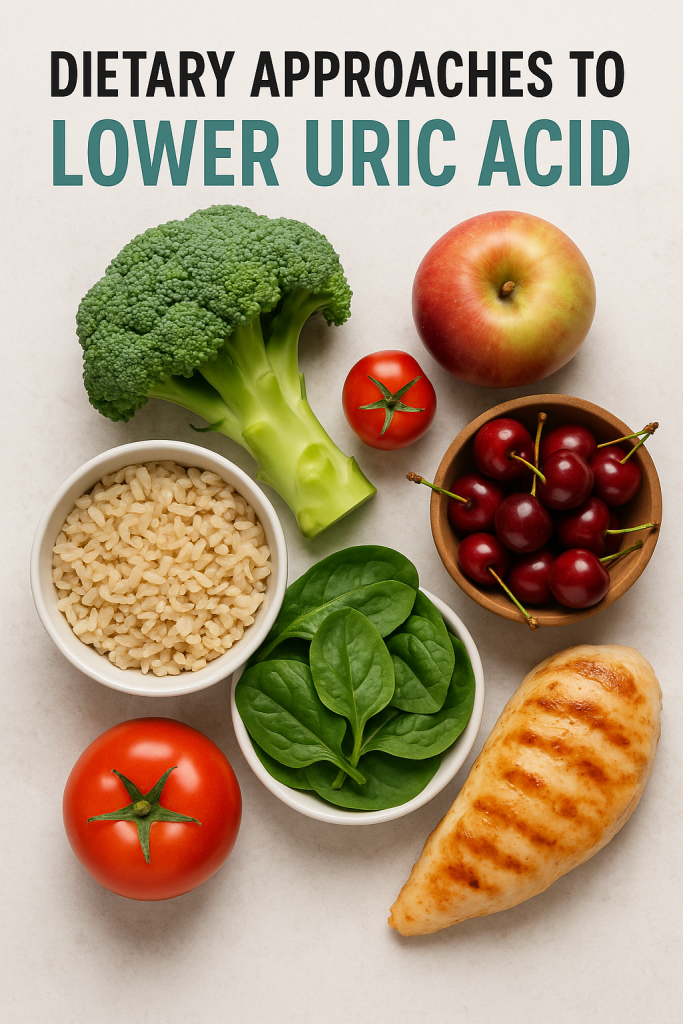
Diet plays a pivotal role in managing uric acid levels. Adjusting your uric acid diet to reduce purine intake and include protective foods can significantly influence serum uric acid. Research shows that overall dietary patterns affect hyperuricemia risk: plant-based diets are associated with a lower risk, whereas meat-heavy or sugar-heavy diets increase riskpmc.ncbi.nlm.nih.govpmc.ncbi.nlm.nih.gov. This section will detail uric acid foods to avoid and foods to emphasize for naturally lowering uric acid.
Foods to Avoid or Limit
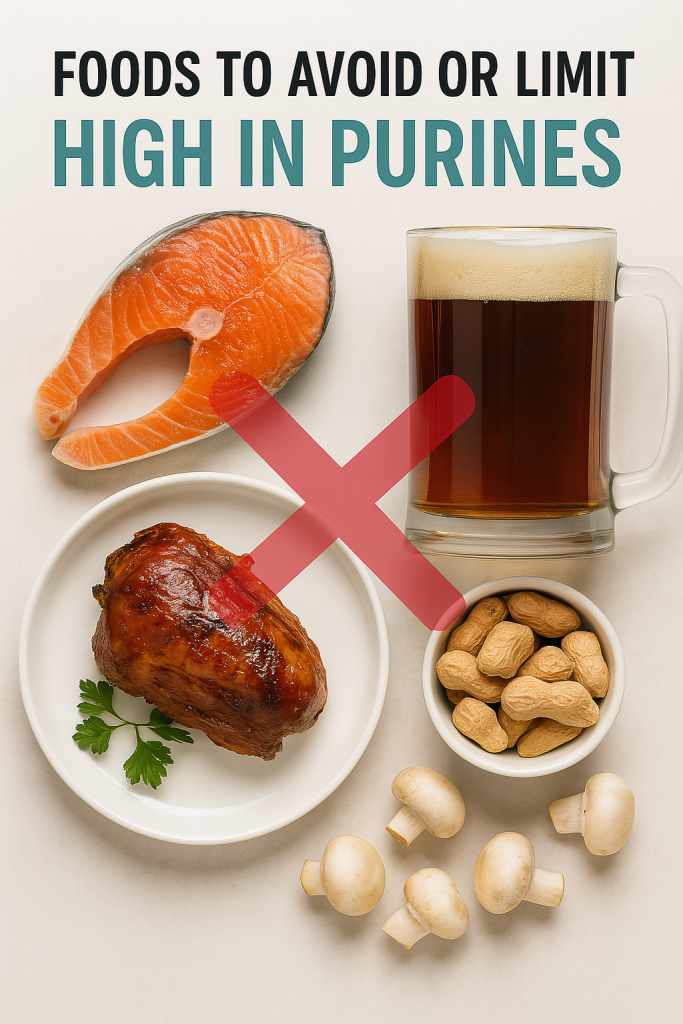
High-Purine Foods: Uric acid is produced when the body metabolizes purines, so reducing purine-rich foods is key. Uric acid foods to avoid include red meat and organ meats , which are very high in purines. For example, frequent consumption of purine-laden foods like red meat and certain seafood significantly raises gout risk – one study noted a 50% higher gout risk in people eating >24 ounces of meat/seafood per week compared to those eating <12 ouncespmc.ncbi.nlm.nih.gov. Shellfish and oily fish like anchovies and sardines are also high-purine and should be limited. By minimizing these foods, purine load is reduced, thereby lowering uric acid productionpmc.ncbi.nlm.nih.gov.
Alcohol (especially Beer): Alcoholic beverages raise uric acid by both increasing purine intake (in the case of beer, which contains brewer’s yeast rich in purines) and by reducing the kidneys’ ability to excrete uric acid. Beer is particularly problematic – studies have found that each additional 12-ounce beer consumed per day can raise gout risk by about 20%pmc.ncbi.nlm.nih.gov. Spirits and wine have a slightly lower impact on uric acid than beer, but excessive intake of any alcohol can trigger hyperuricemia. It is recommended to limit alcohol consumption, and especially avoid binge drinking, to help prevent uric acid builduppmc.ncbi.nlm.nih.gov. For those with gout or high uric acid, abstaining or drinking only minimal alcohol is advisable.
Sugary Drinks and Fructose: Diets high in sugar can exacerbate uric acid levels. Fructose in particular (found in table sugar and high-fructose corn syrup used in sodas and sweetened beverages) raises uric acid by accelerating ATP turnover during fructose metabolism, leading to increased purine breakdownpmc.ncbi.nlm.nih.gov. Regular consumption of sugar-sweetened soft drinks is linked to higher hyperuricemia and gout riskpmc.ncbi.nlm.nih.gov. It is therefore crucial to avoid or greatly limit sugar-sweetened beverages (含糖饮料) such as sodas, sweetened fruit juices, and energy drinks. Even too much natural fruit juice or excessive fruit (especially those high in fructose like soda or orange juice) can elevate uric acid if consumed in large quantitiespmc.ncbi.nlm.nih.gov. Moderation with fruits is key – fruits are healthy, but focus on high-fiber, lower-sugar options like berries and citrus, and avoid consuming fruit in syrup or adding extra sugar.
Other Foods to Use in Moderation: Some vegetables like asparagus, mushrooms, spinach, and cauliflower contain moderate purine levels. However, research indicates that plant-derived purines have less impact on gout than purines from meatpmc.ncbi.nlm.nih.gov. Thus, most vegetables are safe and beneficial to eat liberally, despite their purine content, due to their vitamins, fiber, and ability to improve overall diet quality. Likewise, moderate intake of legumes (beans, lentils) and soy is generally acceptable – they contain purines but also fiber and protein that can be part of a healthy diet. If you have very high uric acid, it may be worth watching portions of these, but eliminating vegetables is not recommended. Finally, avoid excessive yeast extracts (like certain savory spreads) and certain seafood broths which are very high in purines.
Foods and Nutrients to Emphasize
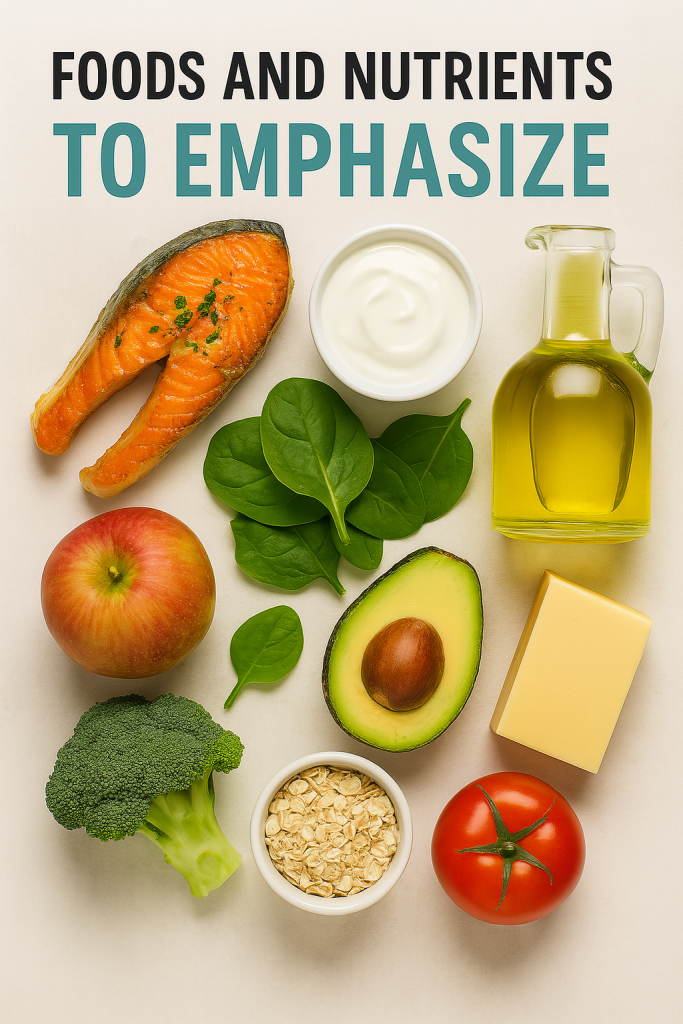
While avoiding certain foods, it’s equally important to eat a diet that helps lower uric acid. Emphasize a plant-forward, high-fiber diet rich in vegetables, fruits, and whole grains. Such diets are associated with a significantly lower risk of hyperuricemiapmc.ncbi.nlm.nih.gov. The following foods and nutrients can actively help in uric acid management:
Low-Fat Dairy Products: Milk, yogurt, and other low-fat dairy have a urate-lowering effect. Studies report that dairy intake is associated with reduced serum uric acid levelspmc.ncbi.nlm.nih.gov. One clinical trial found that skim milk intake led to a ~10% decrease in uric acid levels, whereas a comparable amount of soy milk actually increased uric acidmdedge.com. Dairy contains proteins (like casein and lactalbumin) and orotic acid which promote uric acid excretionmdedge.commdedge.com. Recommendation: Incorporate skim or low-fat milk and unsweetened yogurt into your daily diet. For example, use milk with breakfast cereal or have yogurt as a snack. These can be beneficial parts of a “uric acid diet” to lower levels naturally.
High-Fiber, Plant-Based Foods : Diets rich in vegetables, legumes, and whole grains can help control uric acid. Fiber can bind to uric acid in the gut and promote its excretion, and plant foods may improve insulin sensitivity which in turn helps uric acid metabolism. Epidemiological studies have found that a plant-based diet is associated with 17% lower odds of hyperuricemiapmc.ncbi.nlm.nih.gov. In contrast, diets high in sweets and animal foods increase the riskpmc.ncbi.nlm.nih.gov. Recommendation: Fill half your plate with vegetables at meals. Opt for a variety of colorful veggies (leafy greens, bell peppers, broccoli, etc.) which provide vitamins and antioxidants. Use beans or tofu as protein sources in place of red meat several times a week. Choose whole grains (brown rice, quinoa, oats) over refined carbs. These changes not only help lower uric acid but also support a healthy weight and cardiovascular health.
Cherries and Vitamin C-Rich Fruits : Perhaps the most famous home remedy for gout is cherries. Scientific evidence backs this: regular cherry consumption has been linked to lower uric acid and fewer gout attacks. A systematic review of studies found that patients regularly consuming cherries or cherry extract had fewer gout flare-ups and lower uric acid levelspmc.ncbi.nlm.nih.gov. In a case-crossover trial, eating cherries over 2 days was associated with a 35% lower risk of recurrent gout attacks compared to no cherriespmc.ncbi.nlm.nih.gov. Cherries are rich in anthocyanins and vitamin C, which have anti-inflammatory and uric acid-lowering propertiespmc.ncbi.nlm.nih.gov. Similarly, fruits high in vitamin C (like citrus fruits, kiwi, strawberries) can help. Meta-analyses of trials indicate vitamin C supplementation (500 mg daily or more) modestly reduces serum uric acid (around 0.3 mg/dL on average)pmc.ncbi.nlm.nih.gov. Recommendation: Eat a serving of cherries (fresh or unsweetened cherry juice) daily if possible during gout prone periods. Include other vitamin C rich fruits such as oranges, grapefruit (if not on conflicting medication), berries, and kiwi. These fruits not only may reduce uric acid but also provide antioxidant benefits. However, keep whole fruit portions moderate to avoid excessive fructose.
Coffee : Interestingly, coffee consumption has been associated with lower uric acid levels and a reduced risk of gout in several studies. A 2016 systematic review and meta-analysis showed that drinking coffee has a significant urate-lowering effect, and that moderate coffee intake is linked to lower gout risk in both men and womenpubmed.ncbi.nlm.nih.govpubmed.ncbi.nlm.nih.gov. In fact, men who drank 4 or more cups of coffee per day had a significantly lower gout incidence, and women required slightly higher intake (due to metabolism differences) to see similar benefitspubmed.ncbi.nlm.nih.gov. Coffee is thought to increase the rate of uric acid excretion and contains antioxidant phenols that might influence uric acid metabolism. Recommendation: If you enjoy coffee and have no contraindications, moderate daily coffee intake (1–3 cups for men, up to 4 cups for women, ideally black or low-sugar) may be beneficial for uric acid controlpubmed.ncbi.nlm.nih.govpubmed.ncbi.nlm.nih.gov. However, avoid super-sweet coffee drinks, and be mindful of caffeine tolerance or other health issues. Those who do not drink coffee shouldn’t start solely for gout without discussing with a doctor, but this is a positive note for current coffee drinkers concerned about uric acid.
In summary, an ideal uric acid-lowering diet resembles other healthy dietary patterns: emphasize vegetables, low-fat dairy, whole grains, moderate lean proteins (especially plant proteins and fish), and low sugar. Specific components like cherries, vitamin C-rich produce, and coffee can provide extra benefit. At the same time, avoid or strictly limit high-purine meats, sugary drinks, and heavy alcohol. Such a diet not only helps lower uric acid naturally but also supports weight management and general wellness, creating a solid foundation for gout prevention.
Lifestyle Modifications for Uric Acid Management
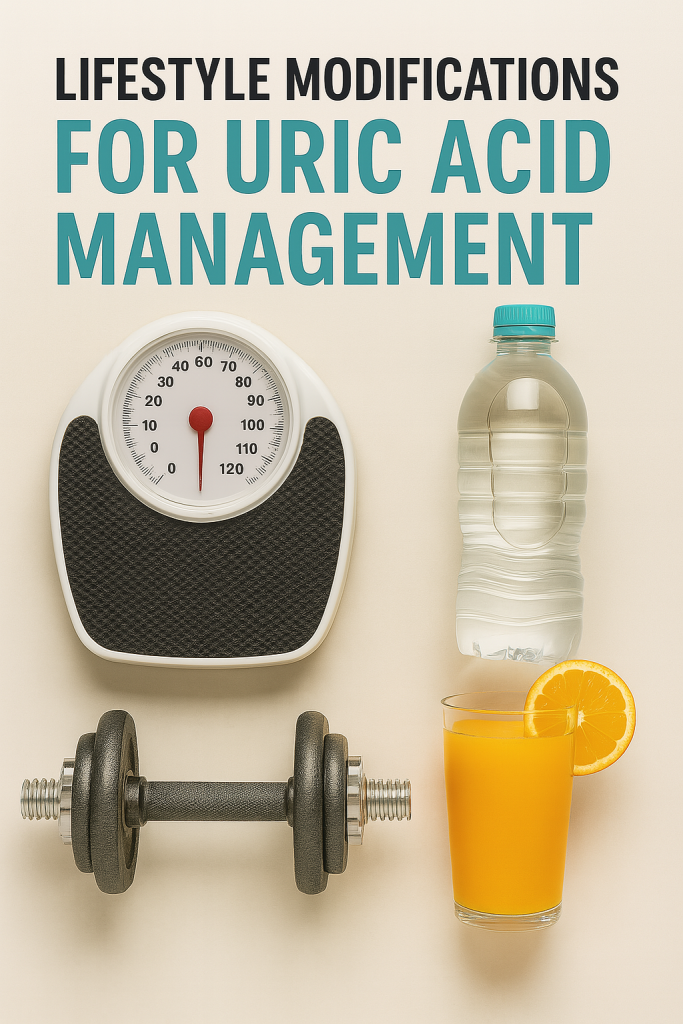
Lifestyle factors significantly influence uric acid metabolism and excretion. Implementing healthy habits can complement dietary measures in naturally lowering uric acid. In fact, guidelines for gout often highlight weight control, exercise, and hydration as key non-pharmacological interventionspmc.ncbi.nlm.nih.govpmc.ncbi.nlm.nih.gov. This section discusses how body weight, physical activity, and other lifestyle choices affect uric acid levels.
Maintain a Healthy Weight : Body weight is strongly correlated with uric acid levels. Being overweight or obese reduces the kidneys’ ability to excrete uric acid and is a major risk factor for goutpmc.ncbi.nlm.nih.gov. Epidemiological data show gout risk rises substantially with higher body mass index (BMI). For instance, a 5-unit increase in BMI is associated with ~55% higher gout riskpmc.ncbi.nlm.nih.gov. One study found individuals with BMI ≥30 had more than double the risk of gout compared to those with BMI <25pmc.ncbi.nlm.nih.gov. The good news is that weight loss can lower uric acid and gout risk. A systematic review of weight-loss interventions in gout patients concluded that losing weight consistently led to fewer gout attacks and lower serum uratepmc.ncbi.nlm.nih.gov. Weight loss improves insulin resistance and decreases inflammation, both of which help in uric acid control. Practical steps: If overweight, aim for gradual weight loss (e.g. 5-10% of body weight over a few months) through a combination of diet and exercise. Avoid crash diets or high-protein fad diets, as rapid changes or excessive purine intake can sometimes trigger gout flares. Instead, focus on sustainable eating habits (like the diet described above) and regular physical activity. Even a modest weight reduction can have measurable effects on uric acid levelspmc.ncbi.nlm.nih.gov.
Exercise Regularly : Regular physical activity helps maintain a healthy weight and may directly influence uric acid metabolism. People with sedentary lifestyles have been found to have higher gout risk; one study noted that individuals with low physical activity had about a 30% higher chance of developing gout than those who were more activepmc.ncbi.nlm.nih.govpmc.ncbi.nlm.nih.gov. Exercise can improve insulin sensitivity, which facilitates uric acid excretion. Additionally, staying fit supports cardiovascular and renal health, both important for managing uric acid. Guidelines: Engage in moderate exercise for at least 150 minutes per week (such as brisk walking, cycling, swimming), or as advised by your healthcare provider. Strength training a couple of times a week can also be beneficial. Avoid intense exertion without proper hydration, as dehydration from heavy exercise (or sauna use) without fluid replacement can temporarily raise uric acidpmc.ncbi.nlm.nih.govpmc.ncbi.nlm.nih.gov. Overall, a balanced exercise routine will aid in gout prevention by improving overall metabolic health and reducing inflammation.
Stay Hydrated: Adequate hydration is one of the simplest natural methods to assist uric acid control. Drinking enough water increases urine volume, which helps the kidneys flush out uric acid more effectivelypharmaceutical-journal.comcontinentalhospitals.com. An interesting internet-based study found that gout patients who drank 5–8 glasses of water per day had a 40% lower risk of recurrent gout attacks, and those drinking >8 glasses had a 46% lower risk, compared to those drinking only one glass or lessmdedge.commdedge.com. This underscores how important water intake is for gout prevention. Dehydration, on the other hand, can precipitate acute gout by increasing uric acid concentration; even sauna use or intense exercise without rehydration has been observed to raise uric acid temporarilypmc.ncbi.nlm.nih.gov. Tips: Aim for at least 2–3 liters of fluid per day (unless medically contraindicated). Water is best; tea or coffee in moderation can count, but be cautious with sugary drinks (which we discussed earlier to avoid). Spread your fluid intake throughout the day. For example, drink a large glass of water in the morning, one with each meal, and additional glasses between meals. When exercising or in hot weather, increase water intake to compensate for losses. Maintaining good hydration not only helps lower uric acid but also benefits overall kidney function.
Other Lifestyle Factors: Certain medications can raise uric acid (for example, diuretics and low-dose aspirin can reduce uric acid excretionpmc.ncbi.nlm.nih.gov). If you are on such medications and have high uric acid, discuss with your doctor; sometimes alternatives can be used. Managing stress is also beneficial – chronic stress hormones might indirectly affect metabolism and inflammation. Ensure you get adequate sleep, as poor sleep can worsen metabolic syndrome components (which include uric acid levels). Lastly, avoid prolonged fasting or very high-protein crash diets, as these can elevate purines or ketones and strain kidney function.
By adopting these lifestyle modifications—healthy weight, regular exercise, and proper hydration—you create an internal environment that discourages uric acid accumulation. These measures, combined with a prudent diet, form a comprehensive natural approach to lowering uric acid and preventing gout recurrencespmc.ncbi.nlm.nih.govpmc.ncbi.nlm.nih.gov.
Natural Remedies and Supplements
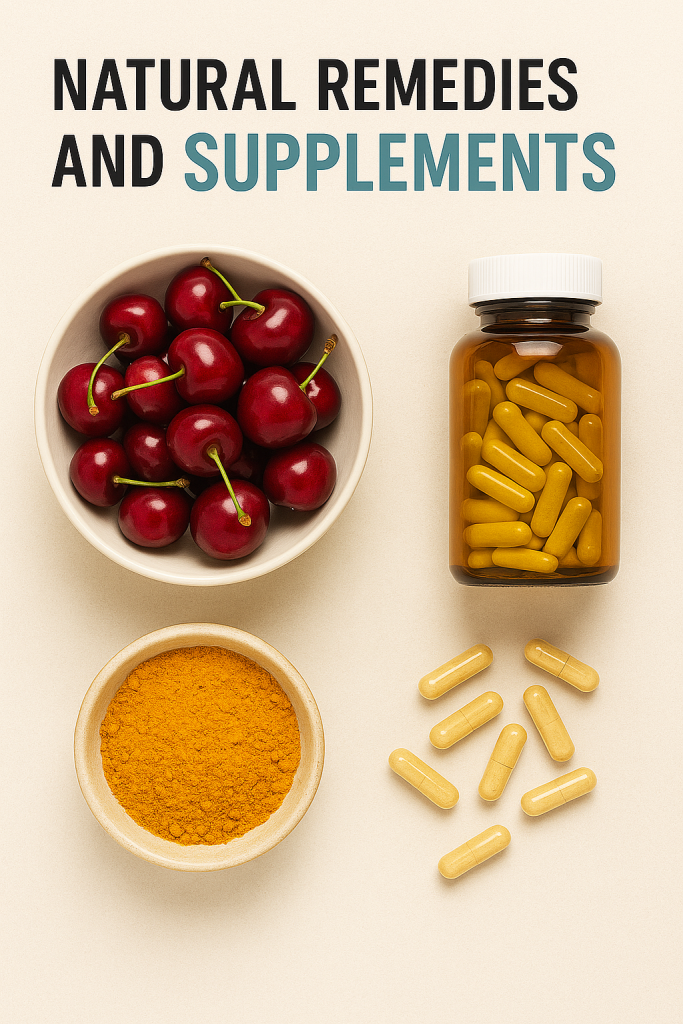
Beyond general diet and lifestyle, researchers have explored specific natural remedies for uric acid control. Certain herbs, nutrients, and supplements can aid in lowering uric acid or reducing gout inflammation. It’s important to approach these as complementary to, not substitutes for, a healthy diet and medical care. Below we discuss some evidence-backed natural interventions, along with their Chinese terminology for clarity.
Herbal Remedies and Anti-Inflammatory Spices : Many traditional systems of medicine, including Traditional Chinese Medicine and Ayurveda, have used herbs to treat gout and hyperuricemia. Modern research is beginning to validate some of these. For example, Terminalia bellerica is an Ayurvedic herb that has demonstrated uric acid-lowering and anti-inflammatory effectspmc.ncbi.nlm.nih.gov. Similarly, ginger and turmeric are spices with potent anti-inflammatory properties; studies indicate ginger (Zingiber officinale) can help relieve joint pain and may modestly reduce inflammation in goutpmc.ncbi.nlm.nih.govpmc.ncbi.nlm.nih.gov. Garlic , a common food with medicinal value, has also been noted to potentially decrease swelling and uric acid levelspmc.ncbi.nlm.nih.gov. In Traditional Chinese herbal medicine, complex herbal formulas like Jiawei Simiao Powder and others have been used for gout. A review of clinical trials found that Chinese herbal medicine formulas had comparable anti-inflammatory efficacy to conventional drugs in gout, with fewer side effects reportedpmc.ncbi.nlm.nih.gov. This suggests a potential role for integrating such herbal approaches. Usage: Incorporating anti-inflammatory herbs and spices in cooking (e.g., using ginger and turmeric in meals) is a gentle way to benefit from their properties. If considering concentrated herbal supplements (like Terminalia or Chinese herbal formulas), do so under the guidance of a qualified healthcare practitioner, especially since herb-drug interactions are possiblepmc.ncbi.nlm.nih.gov. Always source herbal products from reputable manufacturers.
Omega-3 Fatty Acids : Omega-3 polyunsaturated fatty acids, commonly found in fish oil or algae supplements, are well-known for their anti-inflammatory benefits. In the context of gout, omega-3s may help reduce the frequency of flares by tempering inflammation. A systematic review noted that increased intake of omega-3 rich fish was associated with reduced gout flarespmc.ncbi.nlm.nih.govpmc.ncbi.nlm.nih.gov. While omega-3s don’t directly lower uric acid concentration, they can improve gout outcomes and may indirectly assist by improving overall metabolic health. Usage: Consuming fatty fish such as salmon, mackerel, or sardines 2–3 times per week can provide dietary omega-3s (bearing in mind portion control for purines). Alternatively, a high-quality fish oil supplement (or flaxseed oil/algal oil for vegetarians) can be used after consulting with a healthcare provider. Omega-3 supplements at doses of about 1 gram EPA/DHA per day are typical for general health; higher doses might be used under medical supervision for anti-inflammatory effect. These supplements are generally safe, but they can have mild blood-thinning effects, so inform your doctor if you’re taking them.
Vitamin C Supplementation: As mentioned earlier, vitamin C can help lower uric acid by increasing urinary excretion of uratepmc.ncbi.nlm.nih.govpmc.ncbi.nlm.nih.gov. In addition to consuming vitamin C-rich foods, some individuals opt for a vitamin C supplement. Clinical studies have used typically 500 mg to 1,000 mg of vitamin C daily. A meta-analysis of 13 trials found a modest but significant reduction in uric acid with vitamin C supplementation, especially in those with higher baseline uric acidpmc.ncbi.nlm.nih.gov. However, vitamin C is not a cure-all: the effect size is modest (roughly a 0.3 mg/dL decrease), so it’s a supportive measure rather than a primary treatment. Usage: A daily supplement of 500 mg vitamin C is generally considered safe for most people and may be beneficial for those with high uric acidpmc.ncbi.nlm.nih.gov. Higher doses (e.g. 1000 mg) can be used, but doses above 1000 mg may cause digestive upset in some individuals and are usually unnecessary. Always check with your doctor if you have kidney issues before starting high-dose vitamin C, since excessive vitamin C could (rarely) contribute to kidney stone formation in susceptible individuals.
Note on Supplements: Always purchase supplements from reputable sources, as quality matters (to ensure proper dose and purity). Supplements like tart cherry extract, quercetin (a plant flavonoid that may inhibit uric acid production), or other joint health formulas are marketed for gout. Some patients find relief using tart cherry capsules or concentrate as a convenient alternative to eating large amounts of cherries. While evidence supports cherry intakepmc.ncbi.nlm.nih.govpmc.ncbi.nlm.nih.gov, remember these are complementary aids. Monitor your body’s response and keep your doctor informed about any supplements you take.
In embracing natural remedies and supplements, it’s wise to keep expectations realistic. They can be useful adjuncts to an overall regimen of diet and lifestyle changes, and some (like cherry, vitamin C, or fish oil) have scientific support for their role. However, severe hyperuricemia or frequent gout attacks often require medical treatment (like allopurinol or other urate-lowering drugs) to adequately control. Natural approaches can reduce reliance on medication, but one should work with a healthcare provider to monitor progress. When used responsibly, these remedies align with a holistic strategy fitting for a premium wellness lifestyle—addressing the root causes of high uric acid and inflammation in a gentle, sustainable way.
Conclusion
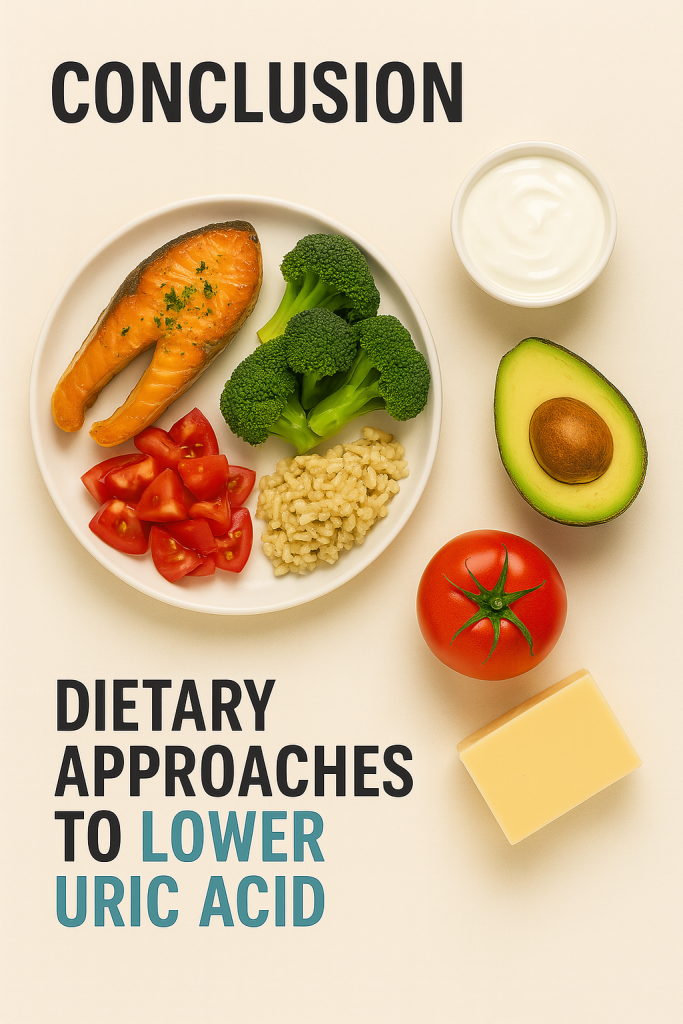
Lowering uric acid naturally is an achievable goal with a comprehensive approach. In this article, we explored how to lower uric acid naturally through targeted diet, smart lifestyle choices, and evidence-based natural remedies. The key takeaways can be summarized as follows:
Diet is fundamental: Adopt a uric acid-conscious diet that limits purine-rich foods (like red meat, organ meats, certain seafood) and avoids excess sugar and alcohol. At the same time, eat plenty of vegetables, low-fat dairy, and moderate amounts of low-purine protein. Incorporate cherries or other vitamin C-rich fruits, and consider coffee if appropriate. This kind of diet has been shown to reduce hyperuricemia risk and support gout preventionpmc.ncbi.nlm.nih.govpmc.ncbi.nlm.nih.gov.
Lifestyle matters: Maintain a healthy weight and engage in regular exercise to improve metabolism and reduce uric acid levels. Stay well-hydrated daily; aim for at least 8 glasses of water, as hydration significantly aids in uric acid excretionmdedge.com. These lifestyle measures not only help lower uric acid but improve overall health, aligning with a high-end wellness philosophy.
Natural remedies can help: Evidence-backed supplements and herbs—such as tart cherry, vitamin C, ginger/turmeric, and omega-3 fatty acids—provide additional tools to manage uric acid and inflammation naturally. They should complement, not replace, the foundational diet and lifestyle changes. Always use these remedies responsibly and in consultation with healthcare providers, especially for severe cases.
In conclusion, the natural management of uric acid requires a multifaceted strategy: prudent dietary choices, healthy living habits, and the selective use of proven natural remedies. For many individuals, these efforts yield tangible benefits — lower serum uric acid, fewer gout flares, and improved quality of life. Equally important, these changes align with preventive health and wellness principles, offering side benefits like better weight control and cardiovascular health. Always remember that individual responses can vary; it’s wise to monitor your uric acid levels and symptoms in collaboration with a healthcare professional. By consistently implementing the approaches outlined above, you can take control of your uric acid levels in a natural, holistic manner, reflecting the BISPIT brand’s commitment to premium health and wellness.
